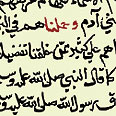
In favor of Arabic studies
צילום: index open
Israelis, learn Arabic
Op-ed: Arabic studies boost State of Israel’s security in the present, build bridge for future peace
Israeli students are obligated to take English and Hebrew exams, but not Arabic (which is an official language in Israel.) Arabic studies for Hebrew-speaking students are mandatory only until ninth grade, and one can choose to study French or another language instead. Indeed, most Israeli students do not take the Arabic matriculation exam.
The duality of the Arabic language and the difference between written and spoken Arabic pose further difficulties. In most schools, spoken Arabic is taught in fifth and sixth grades using Hebrew letters, while in junior high written Arabic is taught using Arabic letters. The result is that most Israelis don’t know Arabic, as the spoken Arabic is forgotten, while written Arabic requires many more hours and years of study.
The fact that Arabic is not a mandatory matriculation exam subject is not merely an indicator of a linguistic problem; rather, it points to a much graver problem. Is this a logical state of affairs when 20% of Israel’s citizens are Arab and the country is surrounded by more than 200 million Arabic speakers?
Not only do our students lack knowledge of Arabic, the history of the Middle East constitutes a highly marginal chapter in the curriculum, which mostly focuses on Europe. In recent years, high school students started to take a class about “The Arab and Muslim world,” yet this welcome initiative did not receive the proper support from the Ministry of Education and has not yet been adopted by most schools.
Hence, we are raising a generation that is detached from the Middle East both linguistically and culturally. Even Jews whose origin is the Arab world no longer speak Arabic like their parents do because they were born in Israel. They no longer take pleasure in Arabic poetry and are unfamiliar with the language’s beauty and richness as their parents were.
Every year, fewer students choose to study Arabic, while at universities as well Arabic language and literature classes are dwindling. In the absence of proper explanations, the students ask themselves: Why do I need to study Arabic?
‘The enemy’s language’
There is no doubt that learning Arabic in the Jewish sector involves breaking down the hostility barrier. Israel’s situation vis-à-vis Arab states ever since its establishment, as well as the ongoing Arab-Israeli conflict, has turned Arabic into the “enemy’s language.” In this context as well, of using Arabic for military and intelligence needs, there is no doubt that the ongoing decline in the Arabic level of high school graduates and number of students learning the languages pose a grave threat to Israel.
Arabic teachers have a highly important mission. They are the ones who open a window to the Middle East for their Jewish students, while also preparing some of them for important military service in the intelligence corps. The State of Israel’s security is premised on intelligence alerts produced by high school graduates of Arabic classes. In other words, Arabic teachers assist in boosting the State of Israel’s security in the present and build a bridge for future peace.
The obvious question is why does the Israeli government, and specifically the Education Ministry, not treat Arabic studies with the appropriate seriousness? This question goes beyond politics, as Arabic studies boost the interests of all parties and political camps. Command of Arabic is required for those who want to understand their neighbors in order to achieve a strategic advantage over them and also for those interested in maintaining peaceful relations with them. Do we want to raise a generation that lives in a bubble or that walks through life like a blind man on the street?
Our children are only exposed to Middle Eastern food but do not understand Islam and Christianity, the Arab revolutions, Arab culture and its values. They are exposed to the Arab world only via the news about terrorism and attacks. Our children see Arab laborers, cashiers and building contractors every day but are not familiar with their world. This unfamiliarity prevents empathy and the ability to understand the Arab minority’s distress in Israel while perpetuating Israeli society’s indifference towards its surroundings.
This state of affairs is even graver among youths, who are indifferent to reality as it is as result of being immersed in a virtual world of iPads, iPhones, YouTube and so on. The ability of our youths to come out of the bubble depends on an Israeli government decision to connect the Jewish people to the Middle East via the Arabic language. This connection will prove to us and to our surroundings that we intend to stay and integrate into this region.
Dr. Yaron Friedman is a graduate of the Sorbonne. He teaches Arabic and lectures about Islam at the Technion, at Beit Hagefen and at the Galilee Academic College. His book, the Nusayri Alawis: An Introduction to the Religion, History and Identity of the Leading Minority in Syria, was published in 2010 by Brill-Leiden










